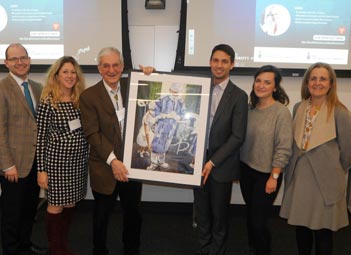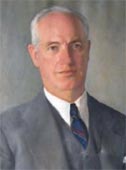THIRD ANNUAL BALFOUR LECTURE
This year’s Balfour Lecture in Surgical Ethics celebrated
the outstanding career of Dr. Martin McKneally. Martin
has been a contributor to surgery and surgical ethics
for several decades both locally and worldwide. In the
engaging style of a master storyteller Martin addressed
several themes that are unique to surgery: the definition
of surgical ethics, surgical innovation, rethinking surgical
consent and learning surgical ethics.

Martin McKneally is celebrated at Balfour Lecture
L-R: Ryan Snelgrove, Karan Devon, Martin McKneally, Mark Camp, Tieghan
Killackey and Annie Fecteau
He suggested that the surgical ethics is founded on
“trustworthiness” which is defined by both competence
and commitment. Both of these have a number of components
but strikingly, “the immediacy of the surgeonpatient
relationship distinguishes it from other caregiving
experience”. This trust leads one to question when
it is okay to try something new, and as Martin adds “on
someone’s mother”. He discussed his journey through
this and other questions leading to some of his landmark
work on innovation. This work has provided guidance
on the appropriate oversight for innovations and has
been implemented very practically in our system, demonstrating
the way in which one can begin with thinking
about ethics and end in practical patient-centered solutions.
He also helped us to understand the sometimes
blurry boundary between research and innovation. Trust
also leads us to reconsider consent, not as a list of ‘risks,
benefits and alternatives’ but as a tool to garner the trust
of surgical patients. He enlightened us on some work
regarding high-risk surgery, and the patient’s perspective
of what is important to them. This was linked to some
of the problems encountered by clinicians who would
like to discuss the challenging issue of life-sustaining
treatment after surgery. He continued by raising the
questions and challenging age-old assumptions about
who should be having certain types of conversations and
in what context.
|
Finally, he highlighted the increasing importance of
a focus on ethics training as an integral part of surgical
training and paid tribute to old and new colleague and
mentors, and of course his “managing partner Deborah
McKneally and beloved family. We were delighted to
have Martin be the third Balfour lecturer. He, as he
always does, has raised the bar.
Karen Devon, Assistant Professor
Division of General Surgery, University of Toronto
THE STORY OF SURGICAL ETHICS

Donald Church Balfour
|
Donald Church Balfour,
1882 – 1963, received his
MD from the University
of Toronto, interned at
Hamilton City Hospital,
and studied surgery at the
Mayo Clinic. His father
was president of the
Balfour Tool Company.
Donald devised and introduced
numerous instruments – an operating table,
operating room mirror for teaching, an abdominal
retractor. He married Carrie, Will Mayo’s daughter,
and spent his distinguished career at the Mayo
Clinic. He became Chief of General Surgery and
President of the Mayo Foundation for Education
and Research. He received many honors and
awards as a surgical educator and scholar. His family
endowed the annual Balfour Lecture that celebrates
his memory and brings distinguished scholars
in Surgical Ethics to teach in our Department.
|
|